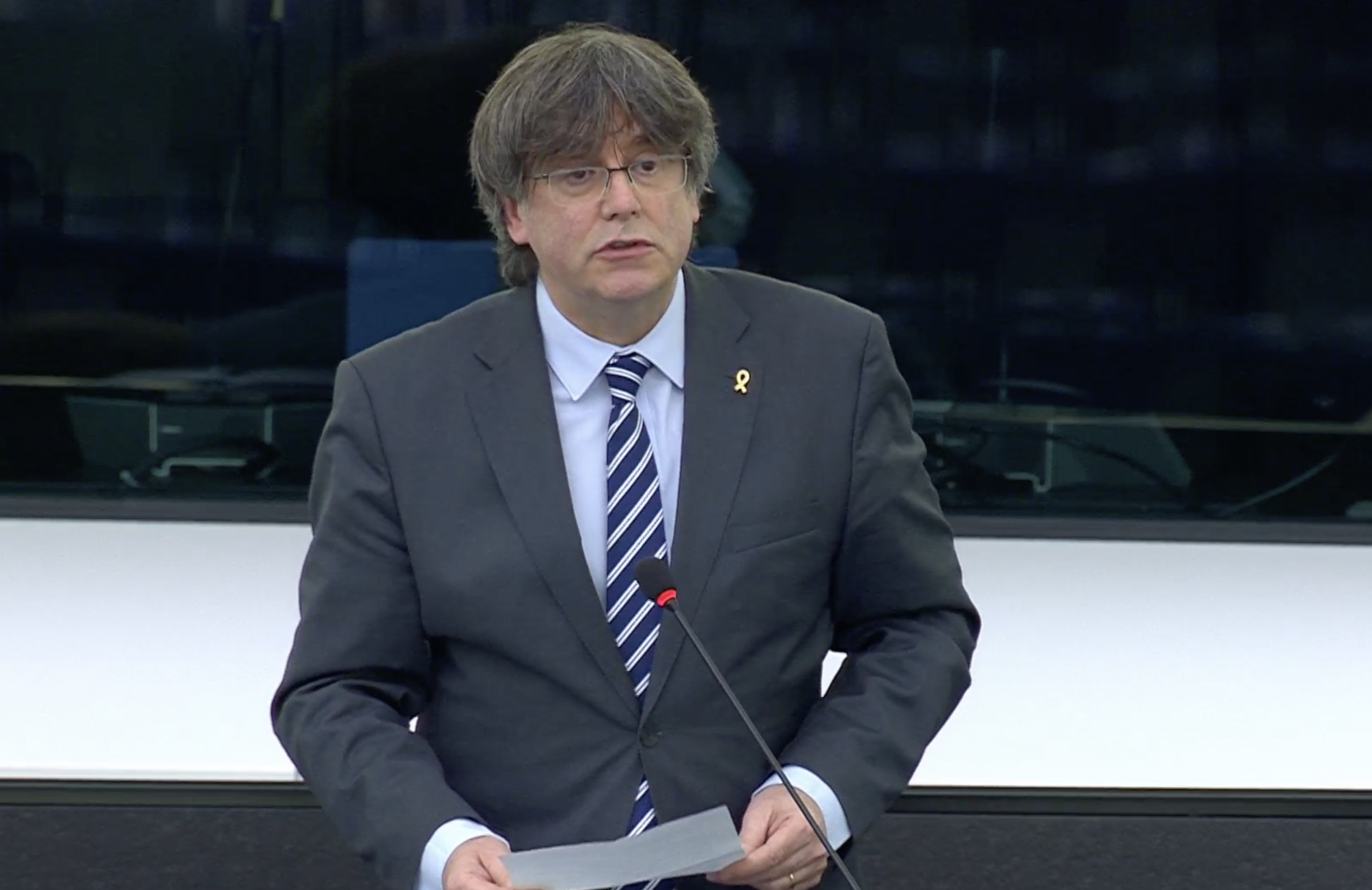The European Parliament held a debate this afternoon under the tendentious title of Cooperation and similarities between the Putin regime and extreme right and separatist movements in Europe. Links between Marine Le Pen and Putin's party were a recurring theme in the debate in the build-up to the French presidential elections, but the reality is that most of the speeches were made with an eye to domestic politics, in particular the contributions of the Spanish MEPs. The accusations by members of the People's Party (PP), Ciudadanos (C) and the Socialists (PSOE) against the Catalan pro-independence representatives, with direct allusions to the Catalan president in exile, Carles Puigdemont (Junts), led to him being granted a right of reply to refute the claims made.
The first person to accuse the independence movement of maintaining relations with Putin was the Spanish PP representative Javier Zarzalejos, who, although he also denounced Podemos's sympathies for Russia, focused on Catalonia. "Even today, in this chamber, they want to teach us lessons on the rule of law, [these] separatists, political instigators of a sedition. Those who denounce a democratic state like Spain when they know that among them there are those who have gone to seek support in Moscow and that they wanted the same apparatus that today act against Ukraine to act against a democratic state and member of the Union," he said.
The same from Spain's Ciudadanos party: MEP Maite Pagazaurtundúa (below) asserted that "Putin's agents have also worked to blow the European Union apart through ethnonationalist parties with Puigdemont and his entourage, with leaders who are hiding in this Parliament to flee justice." Vox did not take part in the debate, nor did the other far-right parties.
For his part, Catalan Socialist Javi López denounced Russian oligarchs for funding Vox and revived the discredited New York Times article on Puigdemont's alleged connections with Russia as saying that "Catalan secessionism or a part of it cultivated relations with Putin."
"It's immoral"
From the ranks of the Catalan pro-independence parties came replies to these claims from Toni Comín (Junts, below)) and Diana Riba (ERC). The Junts MEP recalled that the European Commission itself had said it was unaware of the alleged European intelligence report on which the Times article was based and that, on the other hand, the material it quoted did appear in reports made by Spain's Civil Guard. He denounced that Putin had left Ukraine with mass graves and that "some people are taking advantage of these deaths to legitimize their obsession with Catalonia." "It's immoral," he said, visibly indignant.
"Putin is a good student of Franco, because Spain has also been full of mass graves for 90 years and those who do not want to open these pits or break with Franco are the gentlemen of the PP and their allies Vox, thanks to whom they govern in four Spanish autonomous communities," he said. Comín gave a particularly intense speech, to the point that the vice-president of the chamber cut off his microphone when his minute was over and the MEP continued to raise his voice from the podium. "You went quiet, lad," came a comment from a female voice in Spanish as he returned to his seat.
Diana Riba also rejected the accusations and held up the hyprocrisy of the PP in pointing the finger at the pro-independence parties, while it has incorporated Vox, "Putin's puppets in Spain", into the regional government of Castilla y León, "in the anteroom of a future reactionary government"; she also recalled that Josep Borrell, as Spanish foreign minister three years ago, entered into agreement with the Putin regime on a security group against misinformation. "The Catalan independence movement shares the consensus we have today in this House: peace, the struggle for European values and the fight against the far right. We work to be a full member state in an EU with a character that is federal, diverse, socially-just, green, feminist and radically democratic," she said.
Puigdemont
The references to Puigdemont were so direct during the debate that the Bureau of the European chamber granted him a right of reply (below), with three minutes for a personal statement. The Junts MEP used this opportunity to denounce that direct accusations have been made against him that he could not allow to pass by because they are "a lie created by the Spanish intelligence services". In fact, he called for the intervention of the European Parliament on the matter since neither the Spanish police nor the judiciary are acting.
He referred in particular to the report made by the Spanish police, which includes the alleged links with the Putin government, and recalled that what it described as compromising messages are nothing more than passages from a book that the director from his office, Josep Lluís Alay, was translating about the lives of two former Soviet spies, protagonists of the series The Americans.
The explanation of the pro-independence politician was not to the liking of the vice-president of the House, the Greek socialist Eva Kaili, who was acting speaker at the time and cut off his microphone, warning him that the time he had was to answer the accusations against his person.
Puigdemont reiterated that the meetings which his critics describe as with "Kremlin representatives" consisted in reality of "sharing a coffee for five or ten-minutes" with the person in charge of trade relations with Barcelona Chamber of Commerce over Russia-Catalonia relations, a person who has been granted residence in the EU by the Spanish authorities. "Check whether he was a Russian spy," he said.
What exhausted the acting speaker's patience, however, was Puigdemont's explanation that "while Catalonia was protesting massively to seek to become an independent state, Russian warships refueled more than 50 times in Spanish ports." At that point the vice-president cut him off for good.

